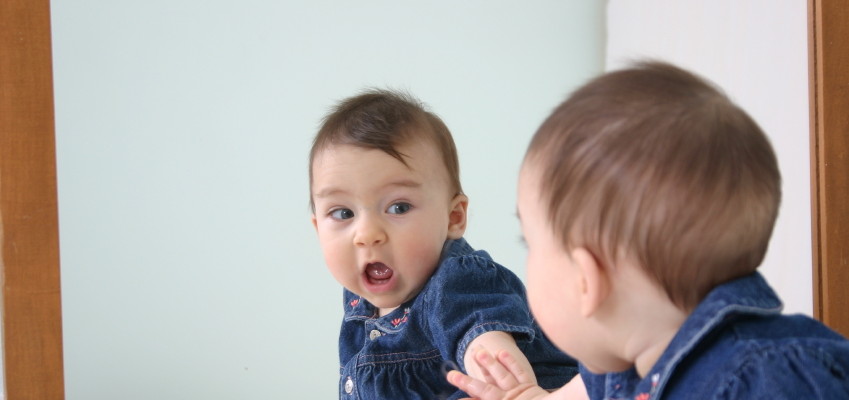
Mirrors: The Essential Toy for Playtime
Choosing the right toys for playtime can be overwhelming! But a simple mirror can offer incredible developmental opportunities for your baby. Infants as young as 3 months show a strong preference for looking at faces. Multiple studies have shown that look time increases in infants when offered a human face, so why not start with yours or their very own.
The longer the look time, the longer the attention span builds, which means more quality impressions and beginning memory traces on your baby’s brain.
Ever wonder if your baby recognizes himself when he’s smiling in the mirror?
“Mirror Mirror on the Wall”
Using a mirror as a toy can offer plenty of language learning opportunities as well as facilitate those early cognitive skills such as imitation and understanding simple cause and effect.
Discovering a Sense of Self
Research studies have shown that babies younger than 15 months do not actually recognize themselves in the mirror. With a simple test, known as the “rouge test,” researchers place a dab of lipstick on the child’s face or nose. If the child reaches toward the mirror, they still have not understood the concept that it is their reflection they are looking at. If they reach for their own nose, which typically happens around 21 months, they have a keen idea of “sense of self.”
Promote Language and Vocabulary
Beginning at 9-12 months, use a mirror during play to teach facial parts (eyes, nose, mouth, hair). Modeling pointing on the mirror or on your face can also help promote vocabulary skills. Help your baby use that pointer finger to show him specific facial parts as you name them.
Promote Imitation
Working on imitation and improving social-emotional awareness is a basic cognitive skill. Does your baby react differently as you show a sad face? Does he giggle as you show a surprised or happy face? Can your toddler imitate these faces in the mirror? Make mirror play a part of a bedtime routine, like brushing teeth to develop these skills.
A Reflection: Mirrors during Playtime
Young babies really do love looking at other faces and even other babies. They are fascinated by human faces, and you can foster this interest by using mirrors, using face time and getting close to them, or through books with baby faces.
Remember that longer look times create longer attention spans, and create more emotional salience for an improved language learning opportunity.
Looking for more Must-Toys during playtime? Check out 10 Great Toys for Language Development
